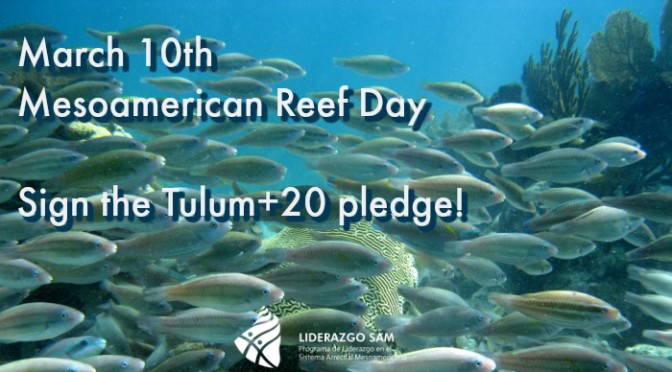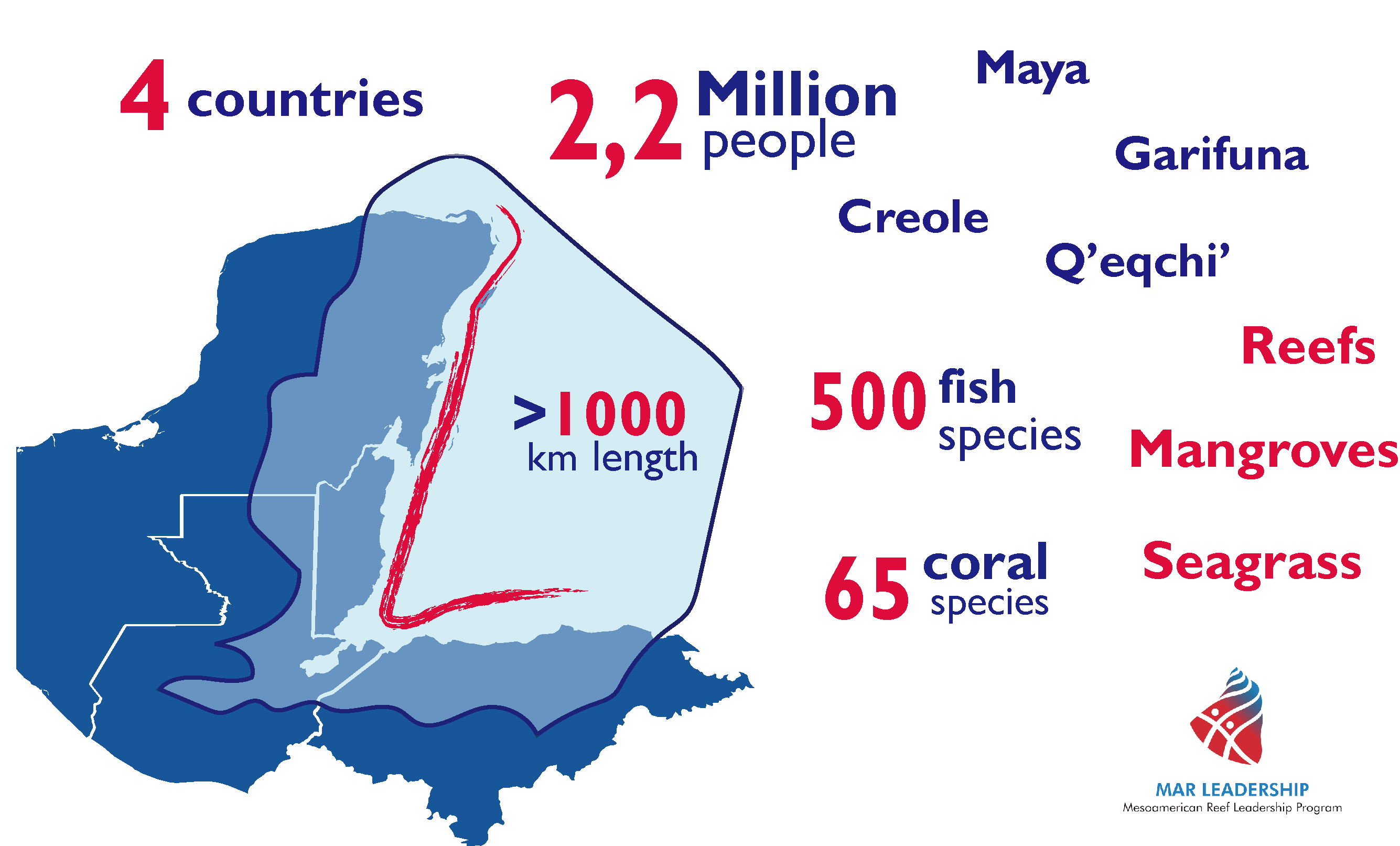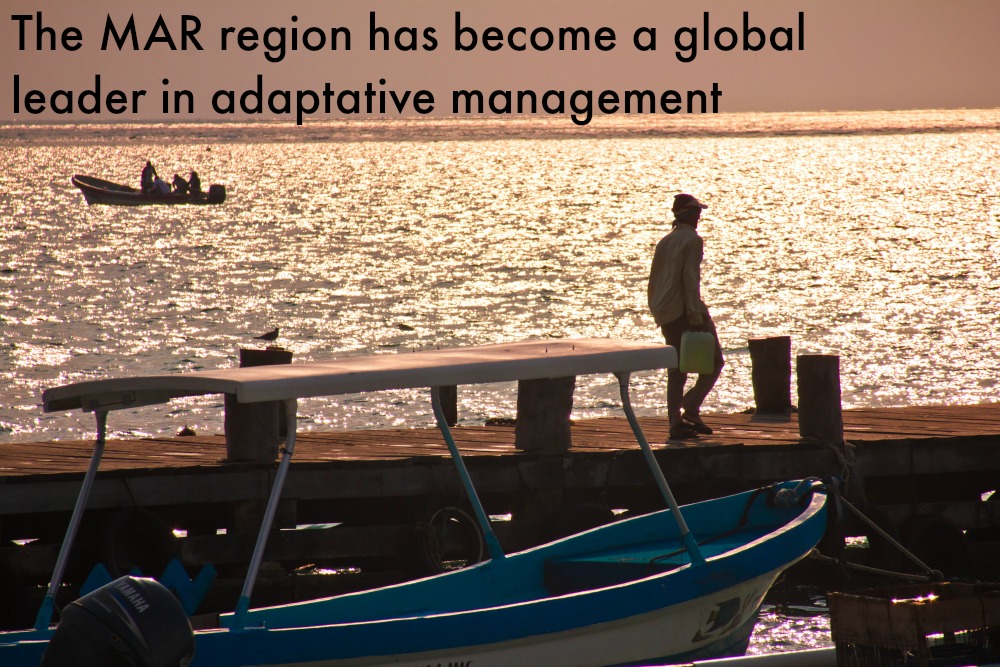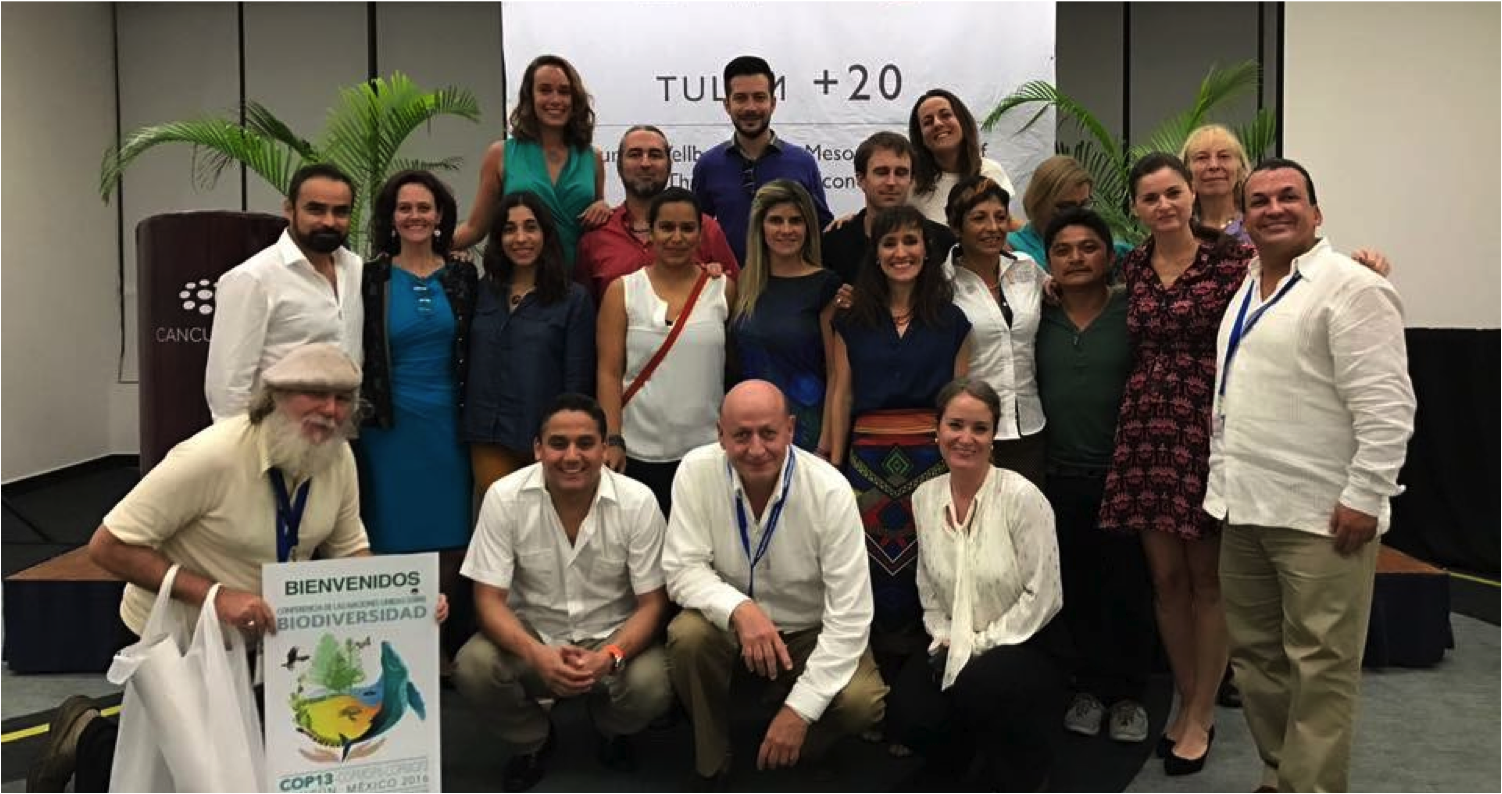Today we celebrate a very special day for us: the Mesoamerican Reef Day!
Being one the most diverse ecosystems on the planet, the Mesoamerican Reef is is the world’s largest transboundary barrier reef, home to two million people from different cultures. Collaboration efforts among the four countries started 20 years ago in 1997, when the heads of State of Mexico, Belize, Guatemala and Honduras singed the Tulum Declaration to promote MAR conservation through its sustainable use. Although great work has been done towards its protection were born since then, the MAR still faces great challenges and needs the renewed commitment from the four countries’ authorities. This is why MAR Fund and MAR Leadership Program/FMCN launch the Tulum+20 pledge.
Mesoamerican Reef Day: know our incredible backyard!
The Mesoamerican Reef system (MAR or MBRS) is the world’s largest transboundary barrier reef, encompassing 1000 km of coastline, from the northeast end of the Yucatán Peninsula, Mexico, to the Bay Islands in Honduras. The MAR ecoregion includes oceanic habitats, coastal zones, tropical forests, and the Caribbean draining watersheds of Belize, Guatemala, Honduras and Mexico. The area is extremely important biologically and economically, with coral reefs, seagrasses and mangroves that provide resources and critical protection against tropical storms. Over two million people including Garifunas, Qeqchi, Maya, and Creole live in the ecoregion and depend on the integrity and resilience of the reef in order to maintain their livelihoods, as well as the national economies of the four countries.
The MAR region: cultural and biological diversity.
The main threats to the MAR are well known –local land-based pollution sources such as solid waste, municipal and industrial sewage, effluents from shrimp farming and agriculture, and severe overfishing to poor coastal & tourism development and global threats such as climate change (including increase in ocean temperature, coral bleaching, acidification, etc.). Current environmental problems need effective multinational responses.
The Tulum Declaration: an international commitment to protect the MAR
As a continuation of the dialogue and cooperation between Central America and Mexico, initiated through the Tuxtla Agreements and following up the International Year of Coral Reefs, the Mesoamerican Reef System initiative was made official in June 5, 1997, when the heads of state of Mexico, Guatemala and Honduras, and Belize signed the Tulum Declaration where they agreed to promote the conservation of the reef system through its sustainable use, thereby contributing to the welfare of present and future generations.
Adaptative management in MAR’s MPAs is inspiring initiatives worldwide.
The MAR region has become a global leader in adaptive management and the active implementation of management actions that are now starting to show ecological results. The MAR now boasts a network of more than 65 coastal and marine protected areas, and almost all of them are under active management. Thirty-six percent of the territorial sea in the MAR is within protected areas, although only 3% is fully protected from fishing. In Belize, spawning aggregations are protected; reef-associated herbivorous fish are protected in Belize, Guatemala, and the Bay Islands of Honduras; a region-wide ban on shark finning has been implemented, and no-take protected areas acting as fish refuges are being created to recover ecosystems and commercial fisheries. Although the advances over the past 20 years are substantial, more needs to be done to protect the MAR from continuing threats to the natural capital it embodies.
COP 13 of CBD: a platform to renew the commitment
The COP 13 that was held in Cancun in December 2016, where about 10,000 participants gathered to negotiate agreements and commitments that promote the conservation and sustainable use of biodiversity. (read our post)
As the host of such important event, Mexico announced the establishment of four new Natural Protected Areas and five Safeguard Areas, placing an additional 65 million hectares under protection. The Mexican Caribbean Biosphere Reserve, the largest marine protected area off the coast of Quintana Roo (5.7 million hectares), will protect almost 50% of the Mesoamerican reef system, where hydrocarbon exploration and extraction will be prohibited. With this action, Mexico has not only joined the small group of countries that have met the Aichi Target to protect 10% of its marine territory, but more than doubled this goal by protecting 23%.
COP13 Tulum+20 side event last December in Cancún, Mexico.
During the COP13, MAR Fund, Fondo Mexicano para la Conservación de la Naturaleza, AC (FMCN)/ Mesoamerican Reef Leadership Program (MAR-L) and HealthyReefsInitiative organized two events called Tulum +20 Declaration for the Mesoamerican Reef and Well-being and Blue Economy attended by 130 people in total. Representatives from both state and municipal governments, Civil Society Organizations (CSO), and academia attended both events. In both events achievements in conservation and sustainable use of coastal and marine resources, regional mechanisms as drivers of change in the Mesoamerican Reef since the Declaration of Tulum in 1997 were presented.
Tulum+20: a pledge for Blue Economy to protect the MAR
Although the MAR countries’ ministers did not attend the Tulum +20 events, we put forth the idea to gather one million signatures from throughout the MAR region to call for the ratification of the Tulum Declaration. On June 5 of 2017, 20 years will have passed since Mexico, Belize, Guatemala and Honduras first committed to conserve the Mesoamerican Reef System through its sustainable use.
Now, Mexico, Belize, Guatemala and Honduras need to take their commitment to the MAR a step further. Currently, four pressing concerns threaten to drastically hurt the health of the MAR: discharge of effluents and contaminants, including sewage; unsustainable coastal development, including mangrove destruction; chronic pressure on fisheries and insufficient enforcement, and climate change impacts on the reef.
To address these threats, the Governments of Mexico, Belize, Guatemala and Honduras must pledge to protect the reef through renewing the commitment to the Tulum Declaration and take actions to ensure the health of the reef and the people that depend on it.
These actions will preserve the resources and natural processes that are the basis for propelling the Blue Economy as the foundation of sustainable development of the four countries and the region.







